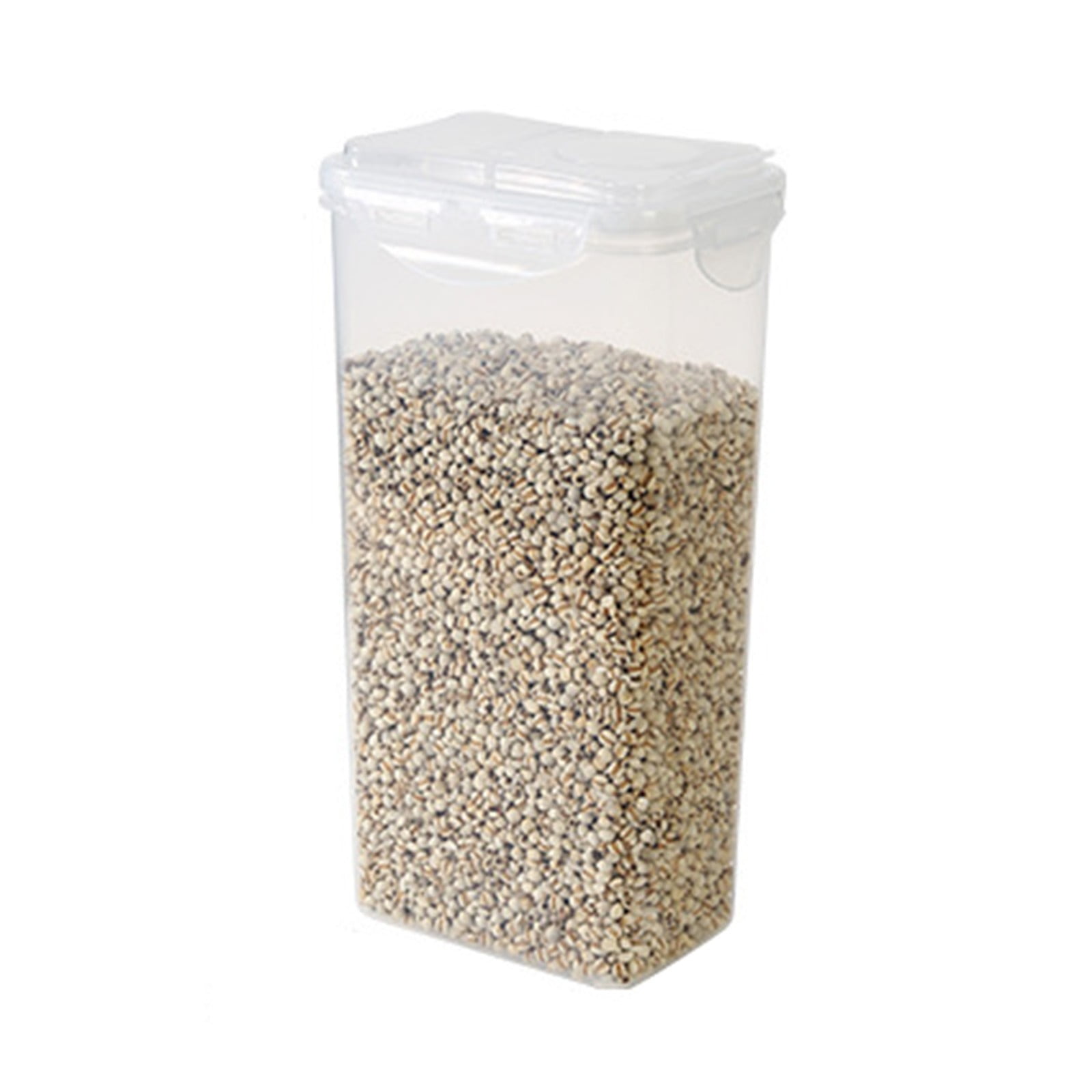Find out how plastic bulk containers can save time for your operations
Wiki Article
The Role of Mass Plastic Containers in Effective Recycling Practices and Sustainability
Bulk plastic containers are important to modern-day reusing initiatives. Their layout improves the effectiveness of material collection and transport, adding to sustainability goals. These containers not only maximize space however likewise assist in monitoring contamination degrees. Their application is not without difficulties. Recognizing the complete scope of their influence exposes an intricate connection in between logistics and environmental obligation that warrants further expedition.Recognizing Mass Plastic Containers
Mass plastic containers work as an important part in numerous sectors, helping with the storage and transport of products. These containers are usually made from durable materials such as high-density polyethylene (HDPE) or polypropylene, which supply resilience and resistance to ecological aspects. Their design typically consists of features like stackability and modularity, permitting effective use room during both storage and transit.Industries such as agriculture, food processing, and making regularly utilize bulk plastic containers because of their light-weight nature and convenience of handling. The containers are available in numerous dimensions and configurations, accommodating the particular requirements of various items. Their flexibility prolongs beyond simple performance; they can also be tailored with covers, takes care of, and identifying alternatives to improve functionality - Bulk Plastic Containers. Because of this, bulk plastic containers play a critical function in optimizing logistics and supply chain procedures throughout several industries, consequently adding to total efficiency and cost-effectiveness
Advantages of Using Bulk Plastic Containers in Recycling
The usage of mass plastic containers significantly enhances the efficiency of the process when organizations prioritize recycling efforts. These containers are designed to enhance room, permitting the storage and transport of larger amounts of recyclable products. This leads to less trips to recycling facilities, consequently lowering fuel intake and linked emissions.Additionally, bulk plastic containers are resilient and resistant to various ecological factors, making certain that products stay safeguarded during handling and transit. Their lightweight design even more adds to lower transport costs.
Moreover, the harmony of these containers assists in far better sorting and processing of recyclable products, which can improve general recycling prices - plastic bulk containers. Organizations that take on bulk plastic containers likewise show a dedication to sustainability, favorably influencing their brand image. Ultimately, these benefits not only enhance recycling practices however likewise contribute to more comprehensive ecological goals
Just How Mass Plastic Containers Facilitate Material Collection
Effective material collection is significantly improved by the usage of bulk plastic containers, as they provide a efficient and organized option for gathering recyclable things. These containers are designed to suit big quantities of materials, which streamlines the sorting and storage process. Their stackable style optimizes room utilization, making it much easier for centers to arrange recyclables without mess.On top of that, mass plastic containers are long lasting and weather-resistant, permitting outdoor placement without degradation. This durability assures that products continue to be safeguarded till they are gathered for processing.

The harmony in shapes and size of these containers assists in standardization throughout collection points, enabling much better monitoring of recyclable volumes. Furthermore, their transparent nature allows for simple exposure of contents, assisting in the monitoring of contamination levels and ensuring that only proper products are gathered. In general, bulk plastic containers play an essential duty in enhancing the material collection procedure, thus advertising efficient reusing practices.
Transportation Effectiveness and Environmental Effect
Transportation efficiency plays a necessary role in the reusing process, specifically with the optimization of tons capability in mass plastic containers. By maximizing the quantity of material carried, business can considerably minimize the number of trips required, thereby decreasing their carbon impact. This strategy not just improves operational performance however also adds to a lot more sustainable environmental techniques.
Optimizing Tons Ability
Although enhancing load ability is frequently forgotten, it plays a necessary function in enhancing transportation efficiency and lessening ecological influence in reusing methods. By optimizing the quantity that bulk plastic containers can hold, recycling operations can decrease the variety of journeys required for transportation. This not just decreases gas consumption however additionally reduces the wear and tear on automobiles. Reliable load monitoring allows facilities to use room effectively, making certain that each transport cycle is as productive as feasible. Furthermore, well-optimized tons can lead to far better arrangements with logistics carriers, possibly lowering overall prices. Eventually, improving lots capability contributes to a more sustainable reusing system by promoting efficient source usage and lessening waste produced during transport.Minimizing Carbon Footprint
As recycling procedures endeavor to reduce their environmental effect, minimizing the carbon impact related to transportation emerges as a crucial goal. Bulk plastic containers play an important function in attaining this aim by enhancing lots effectiveness and maximizing logistics. Their lightweight yet resilient design enables maximum cargo space utilization, reducing the number of journeys called for to transfer products. By settling shipments, recycling centers can decrease fuel usage and greenhouse gas discharges. Furthermore, strategically finding recycling facilities minimizes transport ranges, additionally reducing carbon outcomes. Using fuel-efficient automobiles and alternate energy sources improves general sustainability. By incorporating these practices, the reusing sector can considerably decrease its carbon footprint, adding to a more lasting future.Challenges in the Usage of Mass Plastic Containers
Contamination Concerns
Contamination concerns represent a considerable obstacle in the efficient usage of mass plastic containers within recycling methods. These containers typically gather residues from previous components, causing mixed materials that can impede the reusing procedure. Contaminants such as food waste, chemicals, or non-recyclable materials can jeopardize the stability of the whole set, causing boosted disposal expenses and reduced reusing prices. In addition, improper cleaning or sorting can intensify these problems, making it tough for reusing centers to refine materials successfully. The existence of contaminants not just affects the high quality of recycled products however additionally undermines the overall sustainability efforts focused on minimizing plastic waste. Dealing with these contamination obstacles is vital for enhancing the efficiency of mass plastic container recycling.Recycling Facilities Limitations
Ineffectiveness in reusing framework poses considerable obstacles for the effective administration of bulk plastic containers. Numerous recycling facilities lack the ability to refine huge quantities of these containers effectively, leading to enhanced expenses and delays. Additionally, insufficient sorting technologies frequently lead to contamination, as mass containers may be combined with various other products, complicating the recycling procedure. Minimal transportation options likewise hinder the motion of mass plastic containers to proper reusing facilities, leading to enhanced garbage dump waste. In addition, a lack of standard methods for mass container reusing produces confusion among businesses and consumers, further making complex efforts to advertise sustainability. Resolving these facilities restrictions is necessary to improve reusing methods and make the most of the potential of mass plastic containers in a circular economic situation.Best Practices for Applying Bulk Plastic Containers
They need to prioritize a tactical technique that enhances effectiveness and reduces contamination threats when organizations consider carrying out mass plastic containers in their reusing practices. Choosing the appropriate container size and kind is vital to suit the quantity of products being refined. Organizations should additionally establish clear labeling and signs to guide individuals on proper disposal approaches, lessening confusion and mistakes. Regular training sessions for staff can even more strengthen these methods, making sure every person recognizes their duties in preserving recycling honesty.
In addition, companies ought to execute a routine upkeep routine to check and clean containers, stopping the buildup of contaminants. Partnering with neighborhood recycling centers can additionally enhance the collection procedure, guaranteeing that materials are effectively refined. Companies should keep track of and evaluate their recycling metrics, using this data to improve practices over time and advertise continual enhancement in their sustainability initiatives.
The Future of Bulk Plastic Containers in Sustainable Practices
As companies progressively focus on sustainability, the function of mass plastic containers in recycling techniques is readied to develop significantly. Developments in materials scientific research are bring about the development of recyclable and naturally degradable alternatives, improving the environmental advantages of bulk plastic containers. Additionally, the implementation of closed-loop systems will certainly allow for simpler collection and repurposing of these containers, lowering waste and resource usage.Technical advancements, such as smart radar, will certainly make it possible for companies to keep an eye on the lifecycle of bulk containers, enhancing efficiency in reusing procedures. As customer need for sustainable methods expands, businesses will likely embrace bulk plastic why not look here containers designed for reuse and lasting value. Collaboration in between federal governments and sectors will promote the facility of standardized reusing methods, making navigate to this website certain that mass containers are properly integrated into more comprehensive sustainability initiatives. Generally, the future of mass plastic containers appears promising, with significant capacity for adding to a circular economic situation.
Frequently Asked Inquiries
Just How Are Mass Plastic Containers Made and What Products Are Utilized?
Mass plastic containers are usually made from high-density polyethylene (HDPE) or polypropylene (PP) These products are refined via shot molding or impact molding strategies, leading to long lasting, light-weight containers suitable for different storage space and transport needs.
Can Mass Plastic Containers Be Recycled Numerous Times Before Recycling?
Yes, bulk plastic containers can be recycled multiple times prior to reusing. Their durability and style enable duplicated usage in numerous applications, promoting sustainability and resource performance while minimizing the requirement for new containers.
What Qualifications Exist for Mass Plastic Containers in Recycling?
Numerous qualifications for bulk plastic containers include the Recycling Collaboration's qualification, the Cradle to Cradle Qualified ™ standard, and the Lasting Product packaging Coalition's guidelines, ensuring containers satisfy details environmental and recyclability requirements for effective recycling.Exactly How Do Mass Plastic Containers Compare to Other Recycling Storage Space Options?
Bulk plastic containers supply greater longevity and capacity contrasted to various other recycling storage space choices, reducing the danger of contamination and facilitating effective transportation. Their layout supports better company, enhancing general effectiveness in reusing operations.What Is the Life expectancy of a Bulk Plastic Container in Recycling Processes?
The life expectancy of a mass plastic container in recycling procedures usually ranges from 5 to one decade, depending upon usage, worldly high quality, and ecological conditions, enabling several cycles of usage prior to ultimate disposal or recycling.When organizations prioritize reusing efforts, the application of bulk plastic containers greatly improves the effectiveness of the process. Transportation performance plays a vital duty in the recycling process, specifically via the optimization of load capability in mass plastic containers. The usage of mass plastic containers in recycling methods deals with considerable difficulties, especially concerning contamination issues and constraints within reusing framework. Contamination concerns stand for a substantial obstacle in the efficient usage of mass plastic containers within reusing techniques. When companies consider implementing bulk plastic containers in their recycling practices, they need to focus on a tactical method that improves efficiency and minimizes contamination dangers.
Report this wiki page